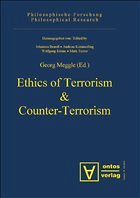Nicht lieferbar

Ethics of Terrorism & Counter-Terrorism
Herausgegeben von / Edited by Philosophische Forschung Herausgegeben Johannes Brandl / Andreas Kemmerling / Wolfgang Künne / Mark Textor
Versandkostenfrei!
Nicht lieferbar
We are supposed to wage war against Terrorism - but exactly what we are fighting against in this war, there is nearly no consensus about. And, much worse, nearly nobody cares about this conceptual disaster - the main thing being, whether or not you are taking sides with the good guys.This volume is an analytical attempt to end this disaster. What is Terrorism? Are terrorist acts to be defined exclusively on the basis of the characteristics of the respective actions? Or should we restrict such actions to acts performed by non-state organisations? And, most important, is terrorism already by its...
We are supposed to wage war against Terrorism - but exactly what we are fighting against in this war, there is nearly no consensus about. And, much worse, nearly nobody cares about this conceptual disaster - the main thing being, whether or not you are taking sides with the good guys.
This volume is an analytical attempt to end this disaster. What is Terrorism? Are terrorist acts to be defined exclusively on the basis of the characteristics of the respective actions? Or should we restrict such actions to acts performed by non-state organisations? And, most important, is terrorism already by its very nature to be morally condemned?
But, having a clear idea of what Terrorism is, would be only the beginning. Rational moral assessment still needs two further components: The relevant facts; and the relevant values and norms.
Now, in a field where systematic disinformation has been even proclaimed to be the official policy, facts are obviously very hard to get at. This volume is mainly interested in Ethics: What's wrong with Terrorism? And what is morally right or morally wrong, respectively, with all the different means of Counter-Terrorism? What are the moral boundaries for waging war agains terrorism? What are the right ways of dealing with terrorists? And what about the alleged anti-terrorism wars on Afghanistan and Iraq?
With contributions from Marcelo Dascal, Tomis Kapitan, Daniel Messelken, Seumas Miller, Olaf L. Mueller, Igor Primoratz, Charles P. Webel , Per Bauhn, Rüdiger Bittner, C. A. J. (Tony) Coady, Haig Khatchadourian, Georg Meggle, Peter Simpson, Carolin Emcke, Ralf Groetker, Laurence Lustgarten, Thomas Mertens, Aleksandar Pavkovic, Filimon Peonidis, Janna Thompson, Véronique Zanetti
This volume is an analytical attempt to end this disaster. What is Terrorism? Are terrorist acts to be defined exclusively on the basis of the characteristics of the respective actions? Or should we restrict such actions to acts performed by non-state organisations? And, most important, is terrorism already by its very nature to be morally condemned?
But, having a clear idea of what Terrorism is, would be only the beginning. Rational moral assessment still needs two further components: The relevant facts; and the relevant values and norms.
Now, in a field where systematic disinformation has been even proclaimed to be the official policy, facts are obviously very hard to get at. This volume is mainly interested in Ethics: What's wrong with Terrorism? And what is morally right or morally wrong, respectively, with all the different means of Counter-Terrorism? What are the moral boundaries for waging war agains terrorism? What are the right ways of dealing with terrorists? And what about the alleged anti-terrorism wars on Afghanistan and Iraq?
With contributions from Marcelo Dascal, Tomis Kapitan, Daniel Messelken, Seumas Miller, Olaf L. Mueller, Igor Primoratz, Charles P. Webel , Per Bauhn, Rüdiger Bittner, C. A. J. (Tony) Coady, Haig Khatchadourian, Georg Meggle, Peter Simpson, Carolin Emcke, Ralf Groetker, Laurence Lustgarten, Thomas Mertens, Aleksandar Pavkovic, Filimon Peonidis, Janna Thompson, Véronique Zanetti



